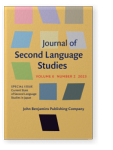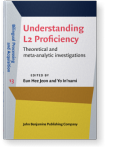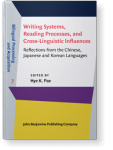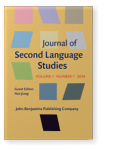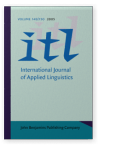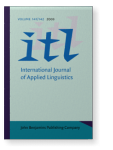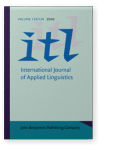Junko Yamashita
List of John Benjamins publications for which Junko Yamashita plays a role.
2023 Development of EFL reading rate in adolescents in Japan: A longitudinal study Current State of Second Language Studies in Japan, Matthews, John and Shigenori Wakabayashi (eds.), pp. 238–265 | Article
This longitudinal study employed latent growth curve modeling to investigate the development of EFL reading rate in a sample of L1-Japanese adolescents from Grade 9 to 11. It also examined the contributions of four components (word recognition, phonological processing, orthographic processing… read more
2022 Chapter 3. L2 reading comprehension and its correlates: An updated meta-analysis Understanding L2 Proficiency: Theoretical and meta-analytic investigations, Jeon, Eun Hee and Yo In'nami (eds.), pp. 29–86 | Chapter
The present study updates Jeon and Yamashita’s (2014) meta-analysis by adding a total of 40 independent samples from 30 additional studies published between 2011 and 2017. Using the method of a quantitative meta-analysis of correlation coefficients, the study synthesizes weighted and, when… read more
2022 Chapter 2. L2 reading comprehension: Theory and research Understanding L2 Proficiency: Theoretical and meta-analytic investigations, Jeon, Eun Hee and Yo In'nami (eds.), pp. 5–28 | Chapter
Multicomponent views of reading constitute a contemporary standard platform toward a more comprehensive understanding of reading and its development. Based on component approaches to L2 reading comprehension, this chapter first outlines linguistic and general cognitive processing necessary for… read more
2018 Chapter 13. Orthographic and phonological processing in L2-English word recognition: Longitudinal observations from Grade 9 to 11 in EFL learners in Japan Writing Systems, Reading Processes, and Cross-Linguistic Influences: Reflections from the Chinese, Japanese and Korean Languages, Pae, Hye K. (ed.), pp. 267–292 | Chapter
There has been a general consensus that readers develop different cognitive mechanisms in response to linguistic properties of languages and writing systems in which they read, and that processing capacities acquired in the first language (L1) may transfer to reading in another language. However,… read more
2018 Possibility of semantic involvement in the L1-L2 congruency effect in the processing of L2 collocations Journal of Second Language Studies 1:1, pp. 60–78 | Article
A growing body of second language (L2) research has identified the congruency effect in the processing of L2 collocations (L2 collocations that have word-for-word translation equivalents in learners’ first language [L1] are processed more quickly and accurately than those that have no such forms… read more
2005 A corpus-based validation study of the universal processing hypothesis in English relative clause formation ITL - International Journal of Applied Linguistics 149/150, pp. 77–91 | Article
The present study focuses on spoken and written data in the British National Corpus (BNC). Based on a review of recent studies on English relative clauses, we formulated a Universal Processing Hypothesis (OS >OO>SS> SO) as target hypothesis to be validated using a corpus data approach. A computer… read more
2002 Reading Strategies in L1 and L2: Comparison of Four Groups of Readers with Different Reading Ability in L1 and L2 ITL - International Journal of Applied Linguistics 135/136, pp. 1–35 | Article
This study compared LI (Japanese) and L2 (English) reading strategies reported by four groups of readers with different reading ability backgrounds. Information on the strategies was extracted by a think aloud method. The following points emerged. (1) Generally speaking, readers tend to transfer… read more
